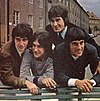Arthur (Or the Decline and Fall of the British Empire)
| Arthur (Or the Decline and Fall of the British Empire) | ||||
|---|---|---|---|---|
| Studio album by The Kinks | ||||
|
Publication |
October 10, 1969 |
|||
| Label (s) | Pye Records | |||
|
Format (s) |
CD, LP |
|||
|
Title (number) |
12 |
|||
|
running time |
49 min 18 s |
|||
| occupation |
|
|||
|
Ray Davies |
||||
|
||||
Arthur (Or the Decline and Fall of the British Empire) is the seventh studio album by British rock group The Kinks . It was released in England on October 10, 1969. All compositions on it are by Ray Davies. It came out after a difficult year for the band following the commercial failure of the previous album The Kinks Are the Village Green Preservation Society and several only moderately successful singles. In addition, bassist Pete Quaife left the band in April 1969 and a successor (John Dalton) had to be found.
Ray Davies created the concept album as a soundtrack for a planned television game, which, however, was never realized due to lack of money. Possibly the commissioning TV production company Granada was the philistine psychogram but also too pessimistic and too unruly. Ray Davies used the drafted plot in collaboration with the English screenwriter Julian Mitchell for the LP.
Ray Davies was inspired to the story "about the decline and decline of the British Empire" by his brother-in-law, who with his wife Rose - the older sister of Ray and Dave, who was featured in the 1967 song Rosie Won't You Please Come Home from Album Face to Face was mentioned - emigrated to Australia. It tells of the rise of the carpet maker Arthur after the Second World War . Both sarcastically and melancholy, the songs describe the former England Arthur once knew, the promise of life in Australia, the emptiness of the comfortable but superficial life in his homeland, the supposed Shangri-La , of the determination of the British people during the Second world war II and the death of his brother in the First world war .
Many of the songs are back in the hard rock 'n' roll style of the early years, which the band had recently neglected, such as Victoria or Brainwashed . Of the decoupled singles Drivin ', Shangri-La and Victoria , only the latter was a modest hit in the UK (33rd place).
The album was again received very positively, especially by American critics, especially in comparison with Tommy , the highly successful rock opera of the British band The Who , which was released in May of the same year.
Arthur, on the other hand, was only a modest commercial success, but was widely viewed as an end to the Kinks' crisis after the disappointments of 1968. A return to American live stages was also possible at the end of 1969 after the lifting of the five-year ban, triggered in 1964 by a dispute with the American musicians' union. And commercial success was to return with the release of the single Lola in June 1970.
Track list
- page 1
- Victoria - 3:40
- Yes Sir, No Sir - 3:46
- Some Mother's Son - 3:25
- Drivin ' - 3:21
- Brainwashed - 2:34
- Australia - 6:46
- Page 2
- Shangri-La - 5:20
- Mr. Churchill Says - 4:42
- She's Bought A Hat Like Princess Marina - 3:07
- Young And Innocent Days - 3:21
- Nothing To Say - 3:08
- Arthur - 5:27.
supporting documents
- ↑ Barry Graves / Siegfried Schmidt-Joos / Bernward Halbscheffel: Das neue Rock-Lexikon Volume 1 . Rowohlt Taschenbuch (October 1998), ISBN 978-3-499-16352-4 , p. 49.
